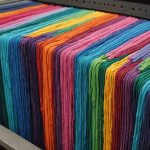Understanding Allergies and Sensitive Skin
Living with sensitive skin requires extra care, particularly when it comes to fabrics. Certain textiles can exacerbate skin irritations, making it crucial to understand how materials interact with the skin. Allergy-friendly fabrics are designed to minimise these reactions, offering considerable relief.
Common allergens in winter fabrics, such as wool or certain synthetic fibres, can lead to skin irritations like itching or rashes. These materials often trap heat, causing sweat and friction, which are notorious triggers for sensitive skin issues. Selecting the right materials is essential for maintaining skin health.
Also to see : Transform your style: innovative tips for rocking a trench coat with a chic, contemporary flair
Exploring allergy-friendly fabrics that accommodate sensitive skin is a wise decision. Materials like organic cotton, bamboo, and certain hypoallergenic synthetics are excellent choices for winter wear. These fabrics are crafted to reduce friction and are often free from harsh dyes or chemicals. Not only do these materials help in preventing skin irritation, but they also provide comfort and warmth during colder months. Thus, ensuring you choose allergy-friendly fabrics can significantly enhance your comfort and overall skin health throughout the winter season.
Types of Allergy-Friendly Winter Fabrics
When dealing with sensitive skin, choosing the right hypoallergenic fabrics can make a world of difference. In winter, it is essential to opt for winter materials that are both effective in keeping warmth and gentle on the skin.
Also read : Essential fabrics for chic layering in cooler weather: the definitive guide you need!
Natural fibres like organic cotton and bamboo are exceptional choices. They are soft, breathable, and gentle, reducing the risk of skin irritations. Wool can be problematic for many, but merino wool is known for its hypoallergenic qualities. Similarly, silk is another natural option that is smooth and less likely to cause itchiness.
On the other hand, some synthetic fibres have improved over time. Many options are now crafted to mimic the gentleness of natural fibres while maintaining durability. Microfibre and certain proprietary blends offer fabric that is both warming and less abrasive to the skin.
Ultimately, it’s crucial to consider not just the fabric composition but its texture and weave. Choosing fabrics that have a smooth finish and are labelled as hypoallergenic can go a long way in ensuring your skin remains comfortable and irritation-free throughout winter.
Top Brands for Allergy-Friendly Winter Fabrics in the UK
When searching for allergy-friendly clothing, the UK offers a variety of excellent retailers. These brands are particularly known for their commitment to utilizing best materials that cater to sensitive skin.
-
BAM Bamboo Clothing: This brand focuses on using bamboo, a naturally hypoallergenic fabric renowned for its breathability and softness. Their winter range combines style with functionality, offering warmth without irritation.
-
Cottonique: Specialising in organic cotton, Cottonique is well-regarded for its dedication to sensitive skin. The absence of chemicals and dyes in their clothing makes it a favourite among those prone to skin irritations.
-
Thought Clothing: This UK company uses a blend of natural and sustainable fabrics, including organic cotton, bamboo, and hemp. Their winter collections prioritize both comfort and environmental considerations.
For those interested in exploring these brands, their collections are available online, and some also have physical stores in major UK cities. Shopping from these best brands ensures that your winter wardrobe remains both allergy-friendly and stylish, prioritising skin comfort and overall health.
Care Tips for Allergy-Friendly Winter Fabrics
For those with sensitive skin, knowing how to care for allergy-friendly fabrics is essential in maintaining their integrity and effectiveness. Proper care can significantly reduce the presence of allergens in both clothing and bedding, ensuring comfort throughout the winter months.
Begin by always following the care instructions on garment labels. This can help maintain the fabric’s hypoallergenic properties. Washing in cold water is recommended, as hot water might degrade delicate fibres and cause skin irritations. Use a gentle detergent formulated for sensitive skin; look for options free from dyes and fragrances to minimise potential irritants.
For drying, avoid high heat. Air drying or using a low-heat setting on your dryer is preferable, preserving the fabric’s texture and longevity. Regularly clean your washing machine to prevent build-up of irritants.
Minimise allergens by vacuuming and dusting your wardrobe areas. Store clean clothing in breathable storage bags to keep dust and mites at bay. This simple practice reinforces fabric hygiene, protecting sensitive skin from unwanted triggers. Implementing these fabric care tips can greatly contribute to sustaining allergy prevention in your daily life.
Styling Winter Fabrics That Are Good for Sensitive Skin
Achieving warmth and comfort without compromising on style is essential for those with sensitive skin during winter. By thoughtfully layering allergy-friendly fabrics, you can ensure minimal skin irritation while maintaining a fashionable look. Start with a hypoallergenic fabric base layer, such as organic cotton or bamboo, which offers softness and breathability. These materials act as a protective barrier between your skin and outer garments.
When layering, opt for winter styling techniques that involve non-abrasive materials. For instance, a merino wool sweater provides warmth and is typically more skin-friendly than traditional wool. Pair it with an allergy-friendly scarf or cap to enhance comfort and style without causing itchiness.
Accessorising is another critical consideration. Choose items made from non-irritating fabrics, like silk or carefully processed synthetics, for items such as hats and gloves. These materials offer aesthetic appeal while keeping skin irritations at bay.
Ultimately, focus on balancing fashion with practicality by selecting pieces that not only align with your personal style but also cater to your skin’s specific needs, ensuring a cosy and irritation-free winter experience.
Where to Purchase Allergy-Friendly Fabrics in the UK
When searching for allergy-friendly fabrics in the UK, options abound for both online shopping and visits to local stores in major cities. This provides a wide array of choices for those with sensitive skin.
Online retailers like Healthy House and Allergy Best Buys specialise in eco-friendly and sustainable fabric options. Their collections cater specifically to sensitive skin, offering hypoallergenic selections that are both accessible and convenient for nationwide delivery.
For in-person shopping experiences, stores like John Lewis and Arket offer sections dedicated to allergy-friendly fabrics. They are available in many city centres, allowing for a hands-on approach to selecting the perfect material.
Local markets and smaller boutique shops can also be treasure troves of unique, sustainable fabric options, often featuring artisanal or lesser-known brands. Exploring these venues may lead to discovering high-quality materials that are not only gentle on the skin but also environmentally conscious.
Whether online or offline, purchasing allergy-friendly fabrics in the UK has never been easier, with solutions tailored to meet the demands of both health-conscious and style-conscious consumers.











